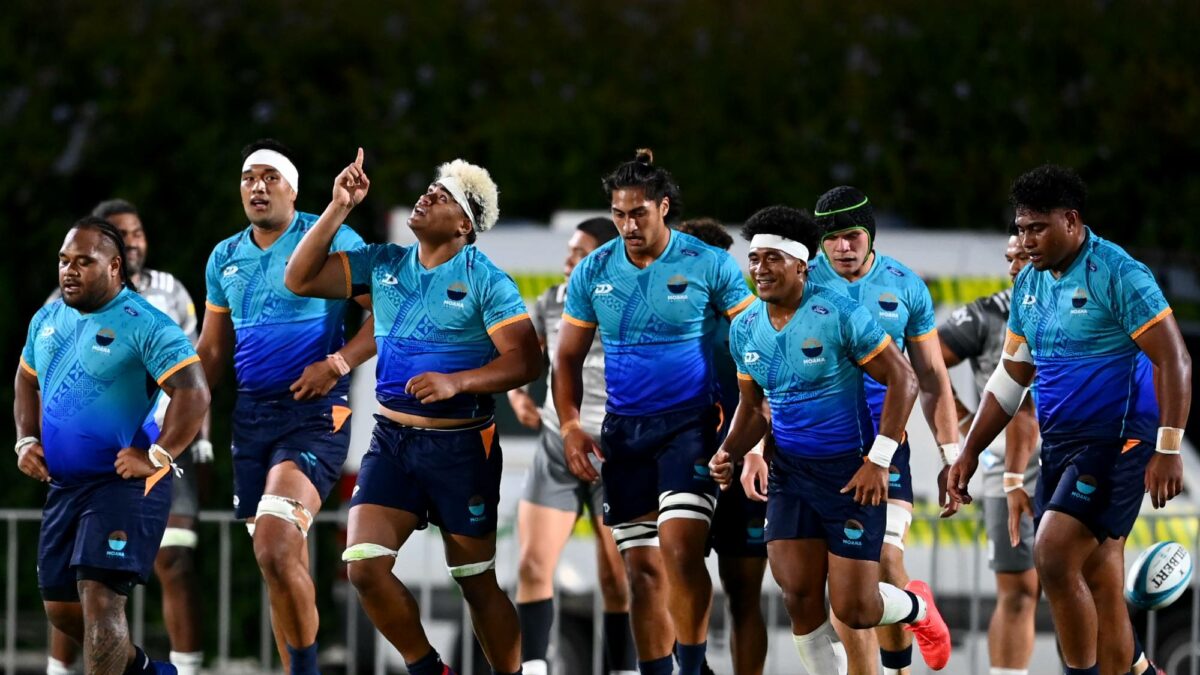
Usually reserved for things like the price of Gingernut biscuits spiralling upwards, or the council digging up the same footpath they’d re-laid only a couple of months earlier, one of my grandmother’s favourite sayings was, “The world’s gone mad”.
If she was around today, she would have been in full voice over the weekend, aghast at some of what passed for expert commentary on the ongoing red card debate, and at Sydney Swans forward Buddy Franklin being mobbed by thousands of fans jam-packed onto the SCG, before being interviewed via a boom mic, so that everyone involved could keep a safe COVID social distance.
Mostly though, she would have been in disbelief at Moana Pasifika winning a Super Rugby match at only their third attempt; 24-19 against the Hurricanes, at Auckland’s Mt Smart Stadium.
It’s been tempting to lump Super Rugby’s two newcomers into the same boat; both facing a huge task against well-established and well-performed franchises, and in the case of Moana Pasifika, with a less than ideal preparation.
Sure enough, both won their third match, both by five points, both play attractive, crowd-pleasing rugby, both sets of players sing beautifully, and both have exceeded expectations at how quickly they have come up to speed.
More than that however, each side has now started to develop their own identity and personality, and are adding value to a competition in need of a vitality injection.
This wasn’t the strongest Hurricanes side to ever take the field, and there’s a strong sense that no Ardie = no Canes, but that’s not the business of Moana Pasifika, and it’s no knock on their stirring, golden point win.
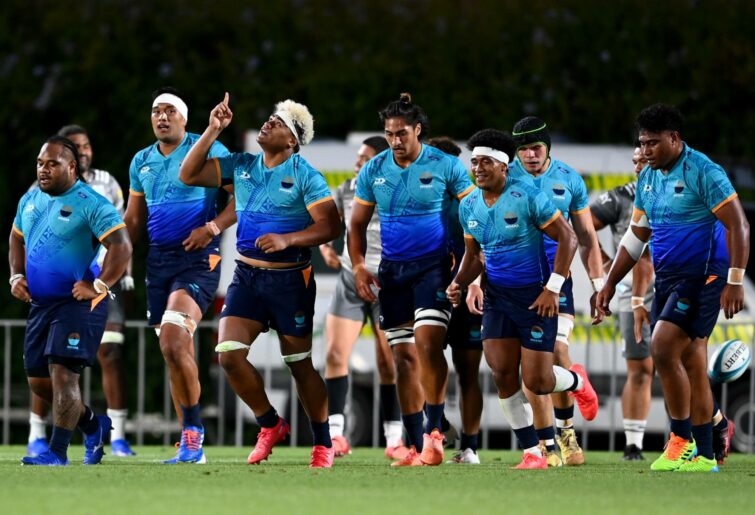
(Photo by Hannah Peters/Getty Images)
It is clear that with Sir Michael Jones and Sir Bryan Williams closely involved, the group carries a deep spiritual base and sense of responsibility that underpins their identity, and which is able to be translated into their on-field performance.
They have talent in their ranks that will only improve with more experience, and they are also getting great mileage from their senior players, in particular the irrepressible Henry Time-Stowers.
As a reward, Moana Pasifika get to line up again on Tuesday against the Blues; a situation that everyone knows is unsatisfactory, but when COVID plays havoc with the integrity of a competition like it has, there is no choice for everyone to suck it up, and get on with business.
The Hurricanes also have no choice but to take their unexpected loss on the chin, although surely it is time to review their golden point strategy. Last year they won the toss against the Crusaders, and elected to play into a strong wind, only to be pinned back and lose to a drop goal.
Keen to make amends, they chose to play with the wind this time, but it wasn’t strong enough to make a material impact. It is surely a better option to elect to kick off, place pressure on the exit, and take first possession from a line-out inside the attacking half.
Also tactically bereft were the Fijian Drua who, after kicking strategically for field position in their first win against the Rebels, this time got caught out playing far too much rugby in their own half.
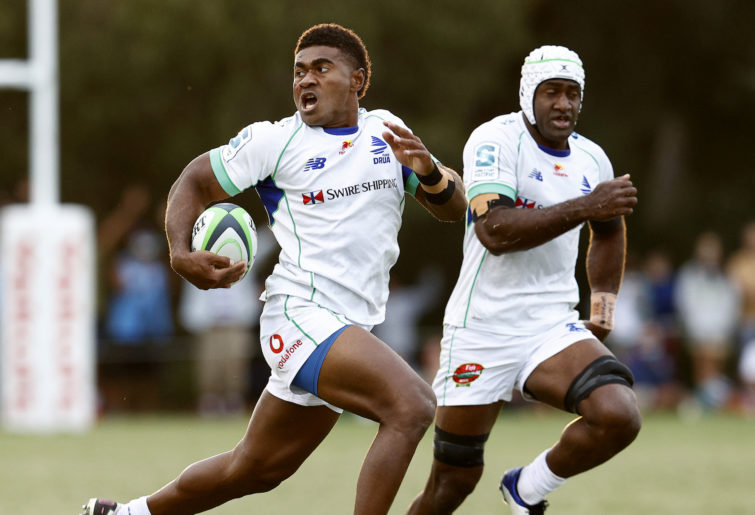
Vinaya Habosi of Fijian Drua. (Photo by Darrian Traynor/Getty Images)
Having missed a third of their tackles last week, the Rebels worked hard this week on defence, and it was that defensive pressure and better execution, coupled with field position, that delivered a 21-6 lead at half-time.
Gradually the dam wall began to creak, but by the time it eventually broke, the Drua were no realistic chance of winning; despite a thrilling, rampaging final ten minutes.
Having had trouble finding the try-line all year, the Rebels were delighted to score 42 points. Nevertheless, on any other night, without that defensive lift, the mood the Drua was in, 42 points wouldn’t have been nearly enough.
Looking for their senior Wallabies to step up, Reece Hodge had a fine all-round match, and his line kicking from penalty was a key factor. Matt Philip too was a commanding presence at lock, perhaps only shaded for man of the match by the rugged Brad Wilkin.
The late game from Perth was a high scoring affair, although despite the tight 39-38 score-line, there was a sense that the Brumbies always had the edge.
That was despite going out the back door faster than an amorous milkman after hearing the man of the house pull up in the driveway, after Tom Banks was forced to leave the field injured, then ordered to stay there, copping a red card for his crude challenge on Toni Pulu.
‘Mitigating factors’ is the latest buzz-phrase to make its way into rugby’s vernacular. It’s essentially a device to help referees to determine the correct sanction, but it’s also fast becoming an avenue for commentators and fans of the impacted team to try to justify why their man shouldn’t be sent off.
In this case, a so-called mitigating factor was that Banks was firstly impacted by the possibility of Pulu stepping back in-field, and secondly, by the fact that he did. How was he supposed to make a fair tackle in those circumstances; the ball carrier putting him in two minds?
In a past generation, this was prime ‘coat-hanger’ territory; the defender over-committing on the outside, being stepped, and throwing out a stiff arm in desperation. Banks could have done that, but he didn’t because he knows it’s dangerous and unlawful.
Other ways Banks could have prevented Pulu from scoring include taking out an AK 47 and pumping him full of lead. Or belting him with a stray piece of 4 x 2. Potentially effective, but again, dangerous and unlawful.
Quite simply, there is no obligation on the part of Pulu to make himself easier or safer to tackle. That’s Banks’ problem to deal with. And if it turns out that a player with the ball can’t be tackled lawfully to prevent him from scoring a try, well… that’s actually the game.
The difference in viewpoints comes about for one simple reason. If one’s starting point is that the offending player had no intent to injure his opponent, then cards are a frustration and an unfair overreaction. Banks didn’t intend to hit Pulu high, the head clash was accidental, therefore he didn’t deserve to be sent off.
On the other hand, if one’s starting point is that incidences of concussion must be reduced, to protect players from suffering crippling afflictions in later life, and that measures to drive changes in player behaviour can be imperfect, but those imperfections are a price worth paying, then this whole messy business becomes much easier to deal with and rationalise.
Perhaps the piece that’s missing is around education and communication. It is crucial for World Rugby and all of those committed to making the game safer to play, that they listen to the neurologists, and not only embrace the lobby groups, but use them to help sell the reasons why things have to change.
A key element is to better educate rugby commentators. Many, in both New Zealand and Australia, are selling the game short, and contributing to much of the frustration felt by fans.
Some are stuck in another age. Others seemingly have no interest in learning and understanding today’s laws, and prefer their own version. Others get where things are headed, and preface their comments with things like “of course we have to protect the players”, but then lack the conviction to challenge their colleagues, and demonstrate a lack of depth in understanding the why and how.
It is high time that all playing nations had a specialist head injuries specialist on their payroll; not necessarily a doctor, but someone with the ability to work with World Rugby, their own medical advisory boards, referees and coaches, and to provide remedial training and education to media, so as to drive a more positive and cohesive approach.
With the global Concussion in Sport Group (CISG) now in disarray following the spectacular demise of its figurehead, Dr Paul McCrory, rugby is about to be forced to adopt new benchmarks and processes anyway.
Unless administrators recognise the problem and act proactively, we will continue to get more weeks like this one, where argument and frustration about tackles, head clashes, TMO’s and red, orange and yellow cards suffocate all of the fun out of the sport.
That’s what happened in Brisbane, where Dane Zander fell foul of Nic Berry, for entering contact too upright and leading with a shoulder to the head of the Waratahs’ Ruan Smith.
In what was a pretty fair game considering the wet and slippery conditions, the Reds overcame their numerical disadvantage to win, going away, by 32-20, to set up another epic contest against the Brumbies next weekend.
No-one has had more focus on him in recent weeks than would-be fullback Jordan Petaia, and his assured all-round performance should have won him plenty of new converts to his cause.
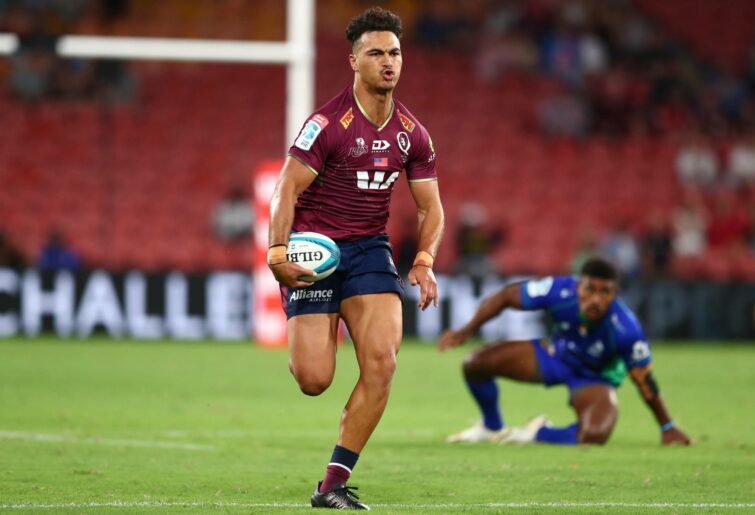
(Photo by Chris Hyde/Getty Images)
The Waratahs didn’t get enough out of the period when they had a two-man advantage, and gave away too many penalties to contend, but for a side missing a number of first-picks, as well as their coach, their first half again showed how they are on the right path.
It was a delight to see a crowd back in Dunedin’s Forsyth Barr Stadium, even if the home side couldn’t get the job done for the mob of scarfies packed into the Zoo. While the Highlanders lifted the tempo in the second half, most of the big moments fell the Blues’ way, for a 32-25 win.
One that didn’t go to plan was a second-half head injury to Beauden Barrett, who has only recently returned after suffering after-effects from concussion suffered against Ireland, in November.
For the people who point to Barrett attempting a low tackle and being bumped in the head as a reason not to fuss over high tackles, in a contact sport like rugby, whatever modifications and law changes that might be made, there will still be head injuries occur. If elimination isn’t possible, reduction is still beneficial.
Of course, tackling low is no guarantee of escaping injury. But much more can be done. It is astonishing to watch the number of world class professional players who, week after week, exhibit poor technique, by getting their head in the way of knees, thighs, hips and shoulders, instead of behind or to the side.
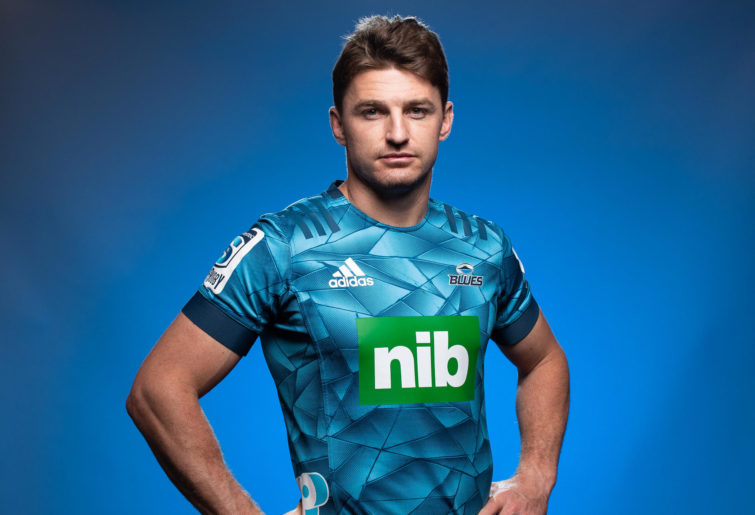
(Hannah Peters/Getty Images)
Another point with respect to Barrett is that the effects of brain injury are cumulative. Perhaps what happened to him in this match might not be quite so concerning if his previous concussion (where he entered a tackle zone far too high) had not occurred?
For a side fresh off a stunning win against the Crusaders in Christchurch, the Chiefs showed a puzzling lack of self-belief back at home, continually kicking the ball away for the Crusaders to run back at them.
It was as if they had decided in advance that the absence of Pita Gus Sowakula would deny them the forward thrust they’d enjoyed in the last few weeks, and opted instead to kick the ball back to the busy Will Jordan and back their defence.
For a good part, that defence was up to the task, but it was no surprise that the weight of possession and territory eventually told, the Crusaders pulling away for a comfortable 32-20 win.
The Chiefs’ Clayton McMillan was another coach in COVID isolation, replaced in the hot seat by Warren Gatland. File your own conspiracy theory here.
With interest and sentiment for Super Rugby in New Zealand at a historic low, it was interesting to note how the return of crowds in Dunedin and Hamilton did seem to lift spirits and provide an atmosphere for the matches that has been sadly missing.
One suspects that the standard of play this year has not been as dire as some would have us believe, and it is the presence of a crowd that provides an important framework and context for the action.
It is still early days for a country tentatively tip-toeing its way through and out of COVID and, for many people, rugby is not as important as it once was. The rest of it, no doubt, can and will be blamed on Ian Foster.
Now that the Six Nations has been completed and the World Rugby rankings have been updated, it’s interesting to note that the top four nations (by some distance) are South Africa, France, New Zealand and Ireland.
Nothing unusual about that, except that all four are on the same side of the 2023 RWC draw, meaning that two of the big four will be exiting at the quarter final stage. That’s potentially great news for Australia and England, but it’s an indictment on World Rugby’s prehistoric practice of determining the draw too far out from the event.
As my dear, departed grandmother Gladys would say; “the world’s gone mad”.